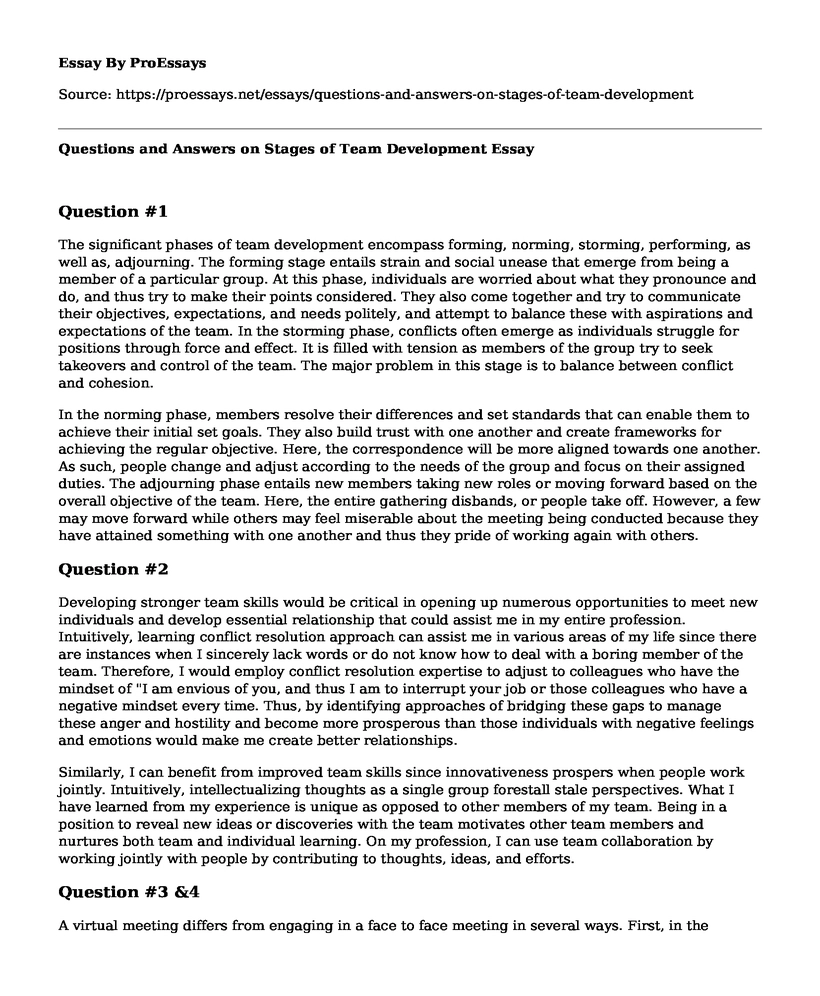Question #1
The significant phases of team development encompass forming, norming, storming, performing, as well as, adjourning. The forming stage entails strain and social unease that emerge from being a member of a particular group. At this phase, individuals are worried about what they pronounce and do, and thus try to make their points considered. They also come together and try to communicate their objectives, expectations, and needs politely, and attempt to balance these with aspirations and expectations of the team. In the storming phase, conflicts often emerge as individuals struggle for positions through force and effect. It is filled with tension as members of the group try to seek takeovers and control of the team. The major problem in this stage is to balance between conflict and cohesion.
In the norming phase, members resolve their differences and set standards that can enable them to achieve their initial set goals. They also build trust with one another and create frameworks for achieving the regular objective. Here, the correspondence will be more aligned towards one another. As such, people change and adjust according to the needs of the group and focus on their assigned duties. The adjourning phase entails new members taking new roles or moving forward based on the overall objective of the team. Here, the entire gathering disbands, or people take off. However, a few may move forward while others may feel miserable about the meeting being conducted because they have attained something with one another and thus they pride of working again with others.
Question #2
Developing stronger team skills would be critical in opening up numerous opportunities to meet new individuals and develop essential relationship that could assist me in my entire profession. Intuitively, learning conflict resolution approach can assist me in various areas of my life since there are instances when I sincerely lack words or do not know how to deal with a boring member of the team. Therefore, I would employ conflict resolution expertise to adjust to colleagues who have the mindset of "I am envious of you, and thus I am to interrupt your job or those colleagues who have a negative mindset every time. Thus, by identifying approaches of bridging these gaps to manage these anger and hostility and become more prosperous than those individuals with negative feelings and emotions would make me create better relationships.
Similarly, I can benefit from improved team skills since innovativeness prospers when people work jointly. Intuitively, intellectualizing thoughts as a single group forestall stale perspectives. What I have learned from my experience is unique as opposed to other members of my team. Being in a position to reveal new ideas or discoveries with the team motivates other team members and nurtures both team and individual learning. On my profession, I can use team collaboration by working jointly with people by contributing to thoughts, ideas, and efforts.
Question #3 &4
A virtual meeting differs from engaging in a face to face meeting in several ways. First, in the former, the participant cannot view expressions and other signs used by other participants. In particular, it is difficult to interact with all participants at a personal level, and thus it is hectic to understand the feeling of the speaker or participants. On the contrary, in the face to face meeting, one can physically interact with participants at times and possibly have an opportunity to observe their expressions regarding the speech. Similarly, in web-based virtual meetings, there is no sound as there is only a virtual keyboard to reply and send a message. This can result in miscommunication because the participant cannot hear the tonal voice of other participants. More importantly, inability to determine the body language of the speaker is a critical challenge, particularly when they are not effective communicators. In face to face meeting, people sit jointly without any form of interference and focus on their agenda. However, in virtual conferences, it is difficult to assure that everyone will concentrate on the agenda without interference from various sources. Principally, I took part I several teleconferences at my previous employment station. The members believed that it was more effective and efficient to hold conferences virtually than having everybody meet at the boardroom and hold discussions. One of how teleconference differed from face to face meeting was the ability to participate from anywhere provided that the set devices are available. In most cases, I was sitting in my car with my mobile phone on speaker while writing down important notes from the conference. Another major way in which virtual conference and face to face meeting differ is the ability to view and hear how the events unfold. In most cases, it is quite difficult to hear what is going on when using virtual conferencing because of the background noise and other factors. However, this challenge can be solved by putting off distractors such as phones unless a specific participant is speaking. Another manner in which virtual conference and face to face differ is the ability to have clear visual examples.
Cite this page
Questions and Answers on Stages of Team Development. (2022, Mar 29). Retrieved from https://proessays.net/essays/questions-and-answers-on-stages-of-team-development
If you are the original author of this essay and no longer wish to have it published on the ProEssays website, please click below to request its removal:
- Essay on Management: Leadership Traits
- Management of Organizational Behavior Essay Example
- Principles of Food and Beverage Service Management Essay
- House Market Crash of 2008: How Lack of Regulatory Oversight Led to the Crisis
- Essay on Unlocking Clinical Decision Support: Strategies for Effective CDS Implementation
- Leadership Decision Making: Northerner Plato vs Eastern Sun Tzu - Essay Sample
- Essay Example on Gathering Intelligence Through SIGINT: Intercepting Signals for Security







